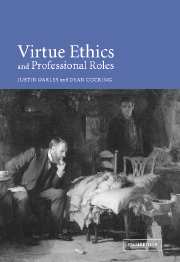Book contents
- Frontmatter
- Contents
- Preface
- Acknowledgements
- Introduction
- 1 The nature of virtue ethics
- 2 The regulative ideals of morality and the problem of friendship
- 3 A virtue ethics approach to professional roles
- 4 Ethical models of the good general practitioner
- 5 Professional virtues, ordinary vices
- 6 Professional detachment in health care and legal practice
- Bibliography
- Index
4 - Ethical models of the good general practitioner
Published online by Cambridge University Press: 22 September 2009
- Frontmatter
- Contents
- Preface
- Acknowledgements
- Introduction
- 1 The nature of virtue ethics
- 2 The regulative ideals of morality and the problem of friendship
- 3 A virtue ethics approach to professional roles
- 4 Ethical models of the good general practitioner
- 5 Professional virtues, ordinary vices
- 6 Professional detachment in health care and legal practice
- Bibliography
- Index
Summary
Over the past few decades, similar concerns to those that have fueled the debate over whether or not friendship is compatible with a life governed by Kantian or consequentialist regulative ideals have also provoked debate as to whether universalist or impartialist ethical theories are able to accommodate various values thought distinctive of certain professional roles – in particular, professional roles within medical and legal practice. According to many writers, there are distinctive role-generated obligations and sensitivities that mark the proper performance of these roles which cannot be accommodated by universalist or impartialist ethical theories. So, for instance, many have thought that there are important agent-relative attachments and loyalties that develop towards one's patient as their general practitioner, or towards one's client in legal practice, and that these attachments and loyalties may license divergence from broadly accepted moral requirements in some conflict cases. We discuss various aspects of this general issue of conflict between professional life and broad-based ethical theory in the following two chapters.
In the present chapter, we begin by addressing one important way in which various writers have claimed to account for the alleged moral independence of certain professional behaviour, namely, by appealing to the model of personal relationships – in particular, friendship – and how our attachments here may sometimes guide us against conflicting moral demands, as a way to justify similar actions in professional life. In section 1, we show why this appeal to the model of friendship is mistaken.
- Type
- Chapter
- Information
- Virtue Ethics and Professional Roles , pp. 95 - 115Publisher: Cambridge University PressPrint publication year: 2001

